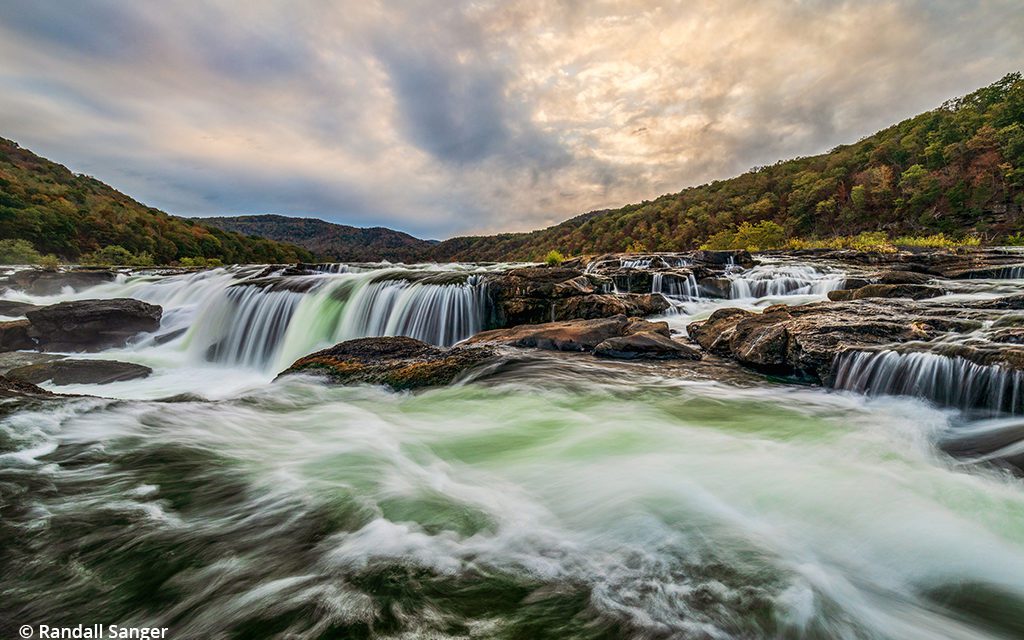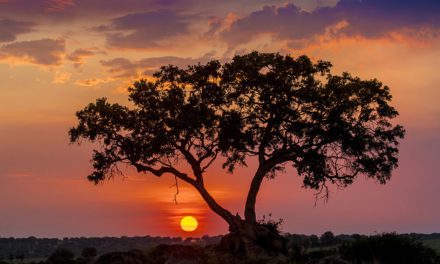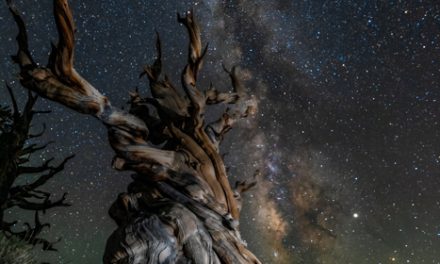With the upgrade from national river to national park status, West Virginia’s New River Gorge National Park and Preserve has generated a great deal of excitement, both here in West Virginia and across the country. While much of the news I have seen focuses on the iconic New River Gorge Bridge, the many outdoor adventure opportunities and the historic value of the Gorge, I am going to highlight a selection of the many waterfalls within and near the park that draw photographers year after year.
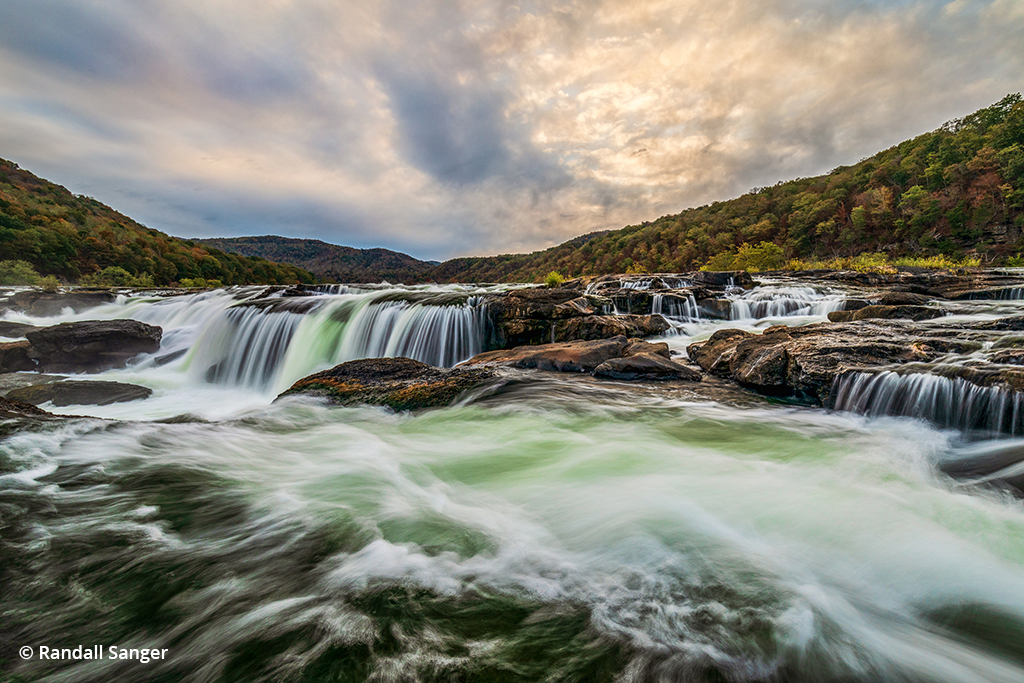
Sandstone Falls
The New River Gorge region is home to well over 100 waterfalls, with many of them nestled in the park’s boundaries. In my books on the subject, the Gorge was broken up into three sections: Upper, Central and Lower. I will follow suit here, starting in the Upper New River Gorge with what I consider the “crown jewel” of New River Gorge waterfalls.
Upper New River Gorge
Sandstone Falls
Sandstone Falls marks the transition zone of the New River from a wide river of large bottomlands to a narrow, rugged river raging through a deep boulder-strewn gorge. Sandstone Falls is easily one of my favorite waterfalls in West Virginia and beyond. Divided by a series of islands on the New River, Sandstone Falls measures in at 15-25 feet high, but its 1,500-foot width is most impressive.
Sandstone Falls is easy to access thanks to an elaborate quarter-mile-long boardwalk and bridge system. The first bridge is small and crosses a manmade channel that once diverted water for a grist mill used by local farmers. The first overlook on the boardwalk offers nice vantage points of the lower section of falls and is a popular spot for fishing. To the left of the overlook, you will notice the Island Loop Trail, which leads you through the Appalachian Riverside Flatrock Community, a unique botanical ecosystem in West Virginia.
The second bridge crosses a wide natural channel with a beautiful view of the lower falls in the distance. The boardwalk ends at an overlook with a 20-foot-high section of falls in the distance. All along the boardwalk, you will notice several user-created paths leading to various vantage points along the channels and river.
The path near the end of the boardwalk is where I invite you to leave the boardwalk and explore. The trail leads to an island with magnificent vistas of the river and the main section of falls. Three stream crossings are required to reach the island, so cross with care during higher water flows. Once on the island, you will be mesmerized by the scene in front of you. This is where you witness the grandeur of Sandstone Falls up close and personal. Compositional choices for photography are numerous here. Visit in the morning hours, and you will often be met with foggy conditions for moody images, and the sunsets here are amazing to witness and capture.
Kate’s Branch Falls
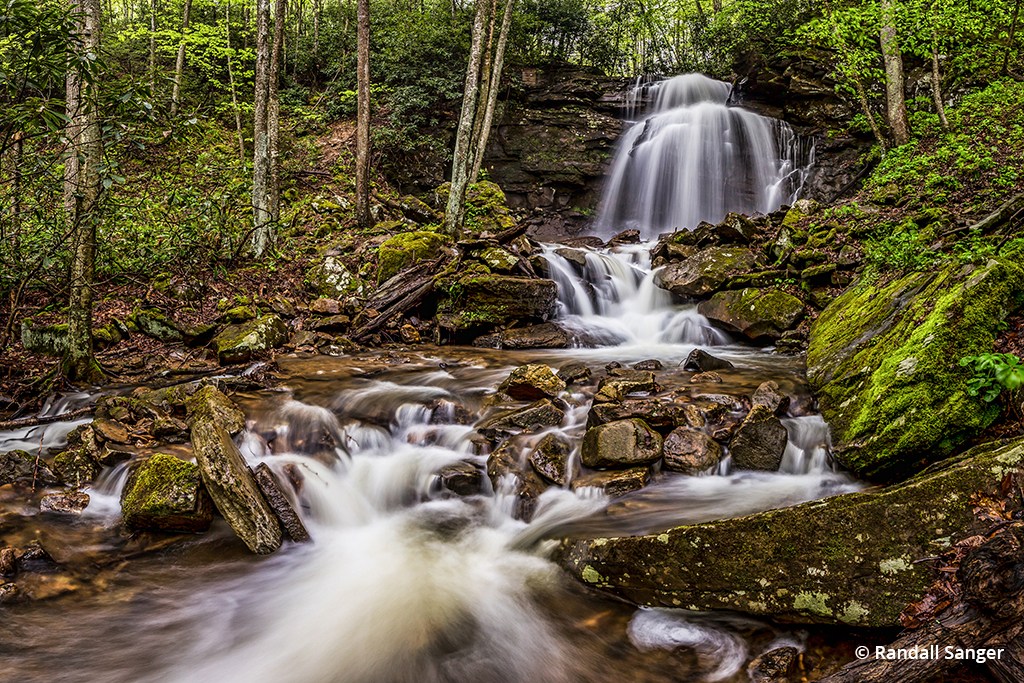
Kate’s Branch Falls
Kate’s Branch Falls is another favorite of mine, but it does need consistent rainfall to really shine and is therefore best visited in early to mid-spring. Trillium is prevalent here and, when in bloom, makes an excellent foreground for your images of Kate’s Branch Falls.
Kate’s Branch Falls is located on a spur trail off of the popular Glade Creek Trail and is a 2.4-mile round trip hike from the upper trailhead parking lot. Or you can start your hike from the lower trailhead parking area and add in a stop at Lower Glade Creek Falls on your way up to Kate’s Branch Falls. Glade Creek is a very picturesque stream, and in the spring, you will find numerous wildflower varieties along the trail.
Brush Creek Falls
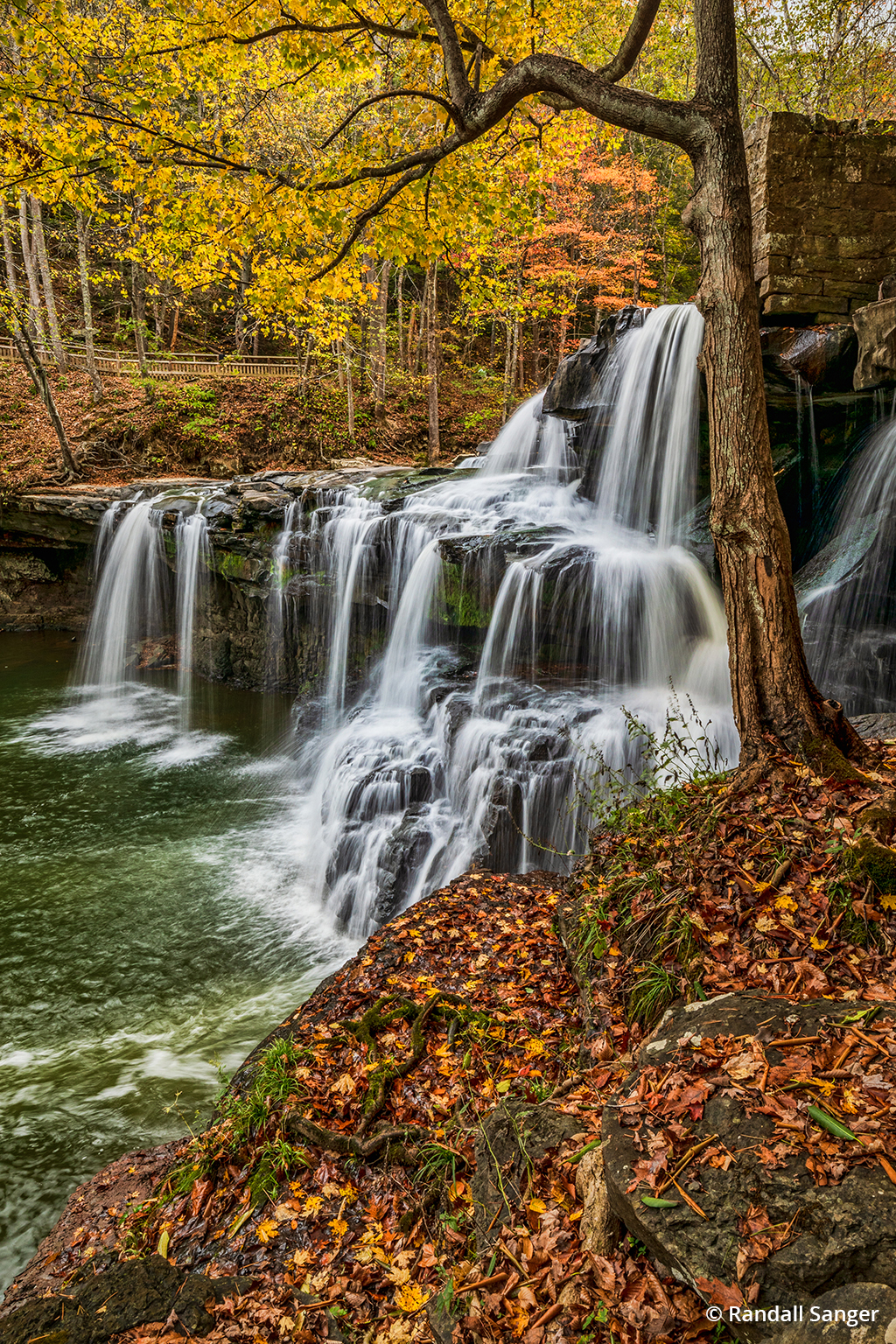
Brush Creek Falls
While outside the national park boundaries, Brush Creek Falls is quite worthy of a mention. Brush Creek is located near Athens, West Virginia, and is maintained and managed by Pipestem Resort State Park. Adjacent to Brush Creek Falls is the Nature Conservancy’s Brush Creek Preserve, a haven for spring wildflowers, migrating warblers, and dramatic limestone and sandstone cliffs.
From the parking area, follow the rock-strewn path for a quarter mile. Your first view of the falls will be what I call the upper falls—a series of small cascades that makes up the ledge of Brush Creek Falls. Continue down the trail a short distance past a wooden fence and make an abrupt switchback down to the creek.
Several nice vantage points for photographing Brush Creek Falls can be found once you descend the path from the trail above. The pool is rather large, though, so my favorite perspectives are in the creek itself or from the other side of the creek. Be careful if you decide to wade into or across the creek; all stream crossings should be made with extra caution due to slick rocks and turbulent water.
For additional photo opportunities, there are some nice stream scenes and small cascades downstream from Brush Creek Falls. Accessing them will require some creek walking or steep scrambles down from the trail. When Brush Creek is raging, take the time to hike an additional 1.5-plus miles to White Oak Creek Falls. Lastly, one more neat little cascade is on the other side of the road at the parking area—you can’t miss it.
Central New River Gorge
Dunloup Creek Falls
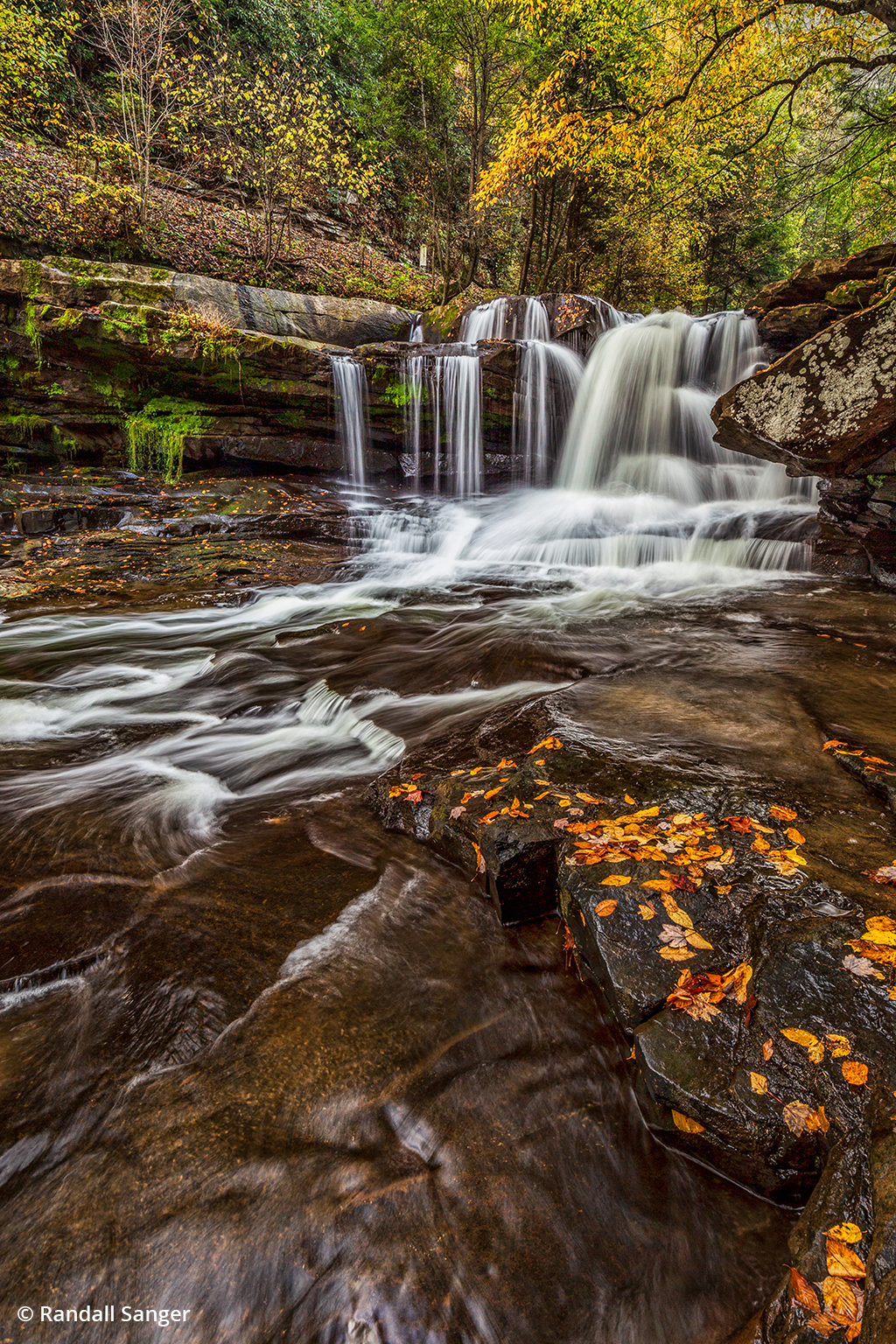
Dunloup Creek Falls
Consistent water levels in even the driest of summer months make Dunloup Creek Falls a wonderful four-season waterfall. The roadside pullout offers a nice view of the falls from above, though a short but steep scramble down to the creek will afford you much better camera angles. I love to get my feet wet at this waterfall. From the center of the stream or near either bank, Dunloup Creek Falls takes on an entirely different look. Be sure to spend some time exploring the creek upstream and downstream from these falls, as there are several small cascades and stream scenes available. Also nearby is the historic ghost town of Thurmond, a popular New River Gorge National Park and Preserve location.
Wolf Creek Falls
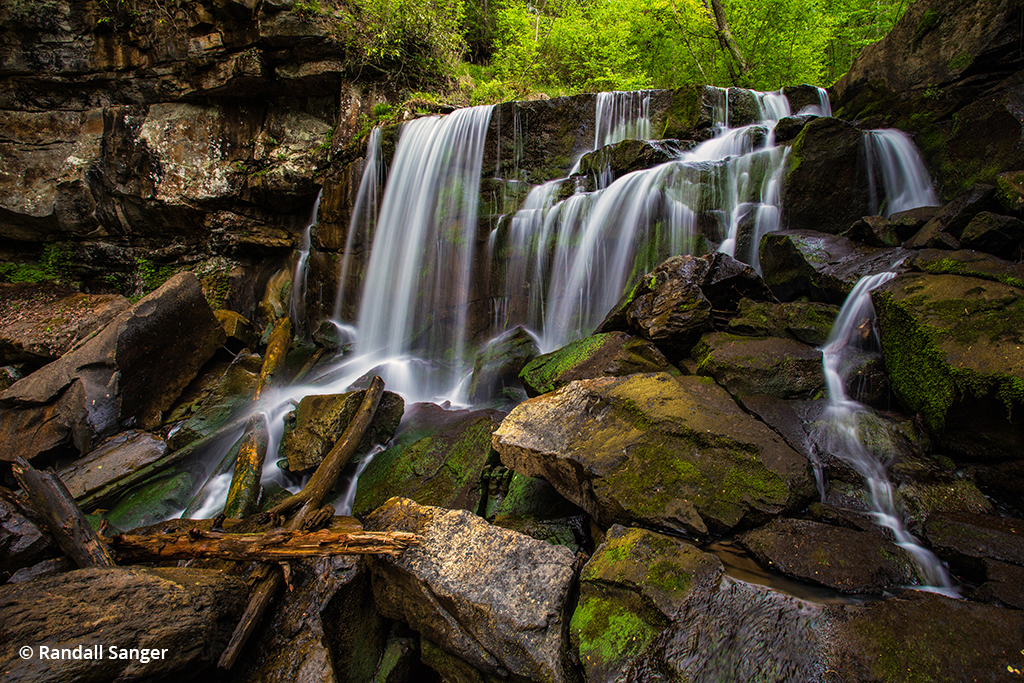
Wolf Creek Falls
While this is a roadside waterfall, many folks driving by miss out on Wolf Creek Falls. It is hidden deep in the canyon and especially difficult to spot when the trees are full of leaves. The path down to the falls is very steep, and I describe the descent as more of a controlled tumble as you make your way down to the creek. About halfway down, you will encounter a jungle of rhododendron, and although you will have to duck a little as you go through, you will be thankful for the lending hand the branches afford. Once through the thicket, you will be at the base of the falls. My favorite perspective here is from a small ledge near where you emerge from the rhododendron jungle. A couple other nice vantage points are from the opposite bank and from a ledge above the falls.
Upper & Lower Fern Creek Falls
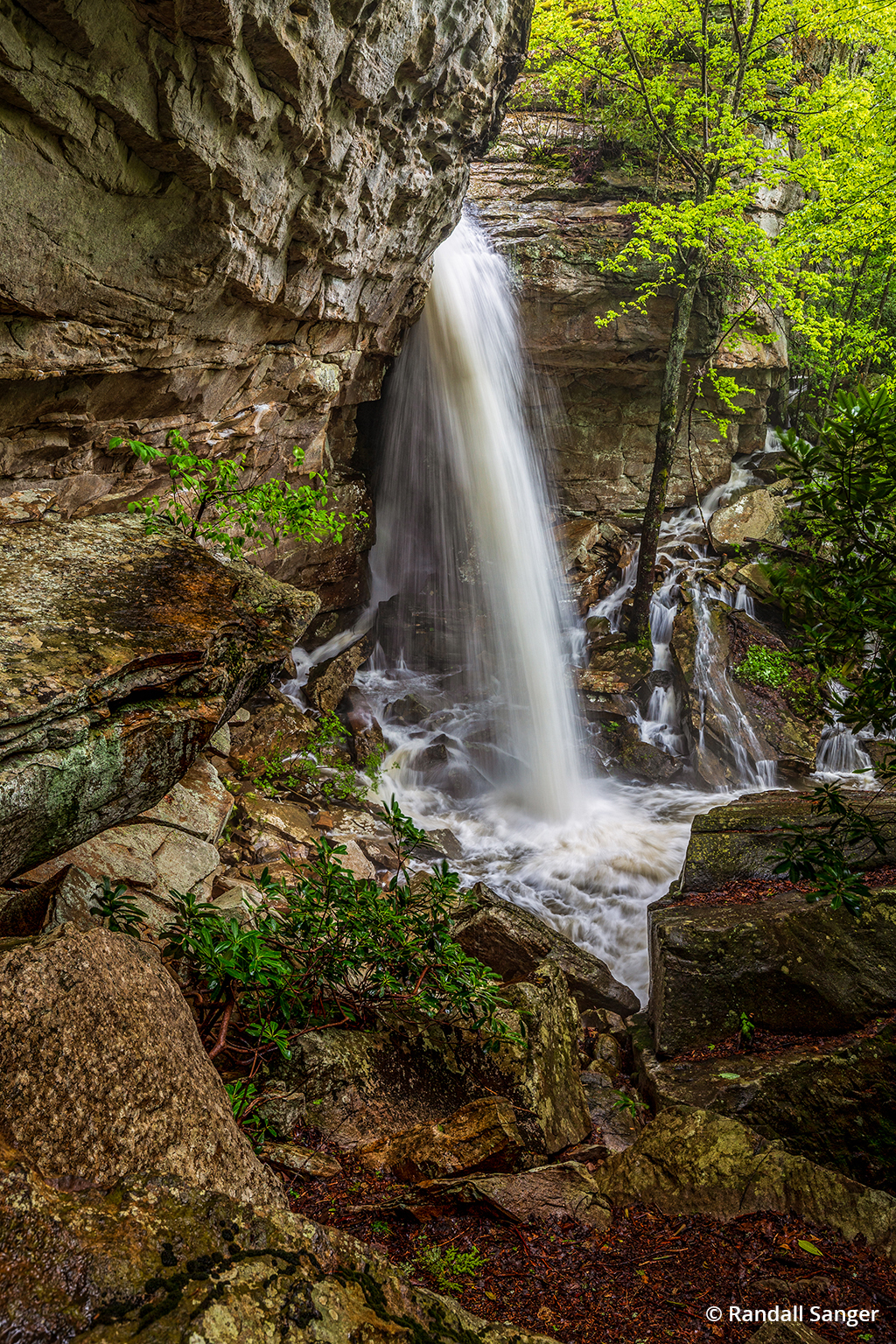
Upper Fern Creek Falls
There are at least a dozen waterfalls on Fern Creek, but I will focus strictly on the upper and lower falls here. Simply put, this waterfall trek is not for everyone. While the approaches to Upper Fern are on established paths, from then on, it is an off-trail bushwhack with seemingly insurmountable obstacles such as rhododendron thickets and house-sized boulders along the way.
There are two approaches to Upper Fern Creek. One is via the highly popular Endless Wall Trail and using a climber’s ladder to descend to the creek. The other is an easy-to-follow path along the cliff line forged by rock climbers.
For most of the year, the upper falls of Fern Creek are mostly hidden from view, as the water is running through a cave-like cleft in the cliff wall. But when the stream is rain-swollen, the upper falls take on a dramatically different personality. Ed Rehbein, my good friend and co-author of our book on New River Gorge waterfalls, adequately describes it as “high drama.” You will hear the thunderous rumble of water well before you see it, and when you round the final bend in the trail, you will be stopped in your tracks at the rugged beauty in front of you. Fern Creek leaps in spectacular fashion over the cleft into an amphitheater strewn with massive boulders—high drama indeed!
From here, you will need to decide if you want to make the difficult trek down to the lower falls and witness the other waterfalls on the way. If you go, you will be descending and then working your way back up on a dangerous and steep grade that requires a lot of off-trail navigation through the previously mentioned obstacles. One more word of warning: This is the only area in the Gorge where I have encountered more than one copperhead snake, so proceed with great caution.
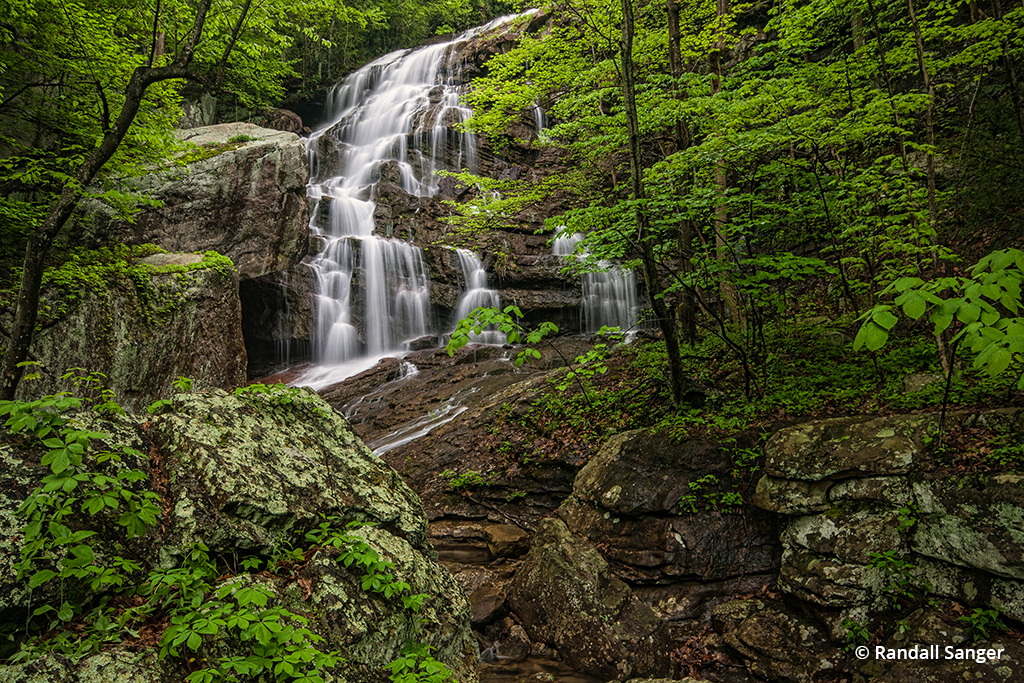
Lower Fern Creek Falls
If you are still raring to go despite these warnings, the best route is to stay on the right side of the stream (looking downstream) as you descend. There are no official trails down into the canyon, but there has been enough traffic in recent years that you should be able to pick up a faint path here and there.
As you carefully work your way down into the canyon, you will pass by several smaller falls and a couple of significant drops, with one of them being what I dub as the middle falls. From here, the scramble on down to the lower falls is a bit easier to navigate, and in a few tenths of a mile, you will reach them. Of all the waterfalls on Fern Creek, the lower falls is my favorite and is quite beautiful.
Glade Creek Falls
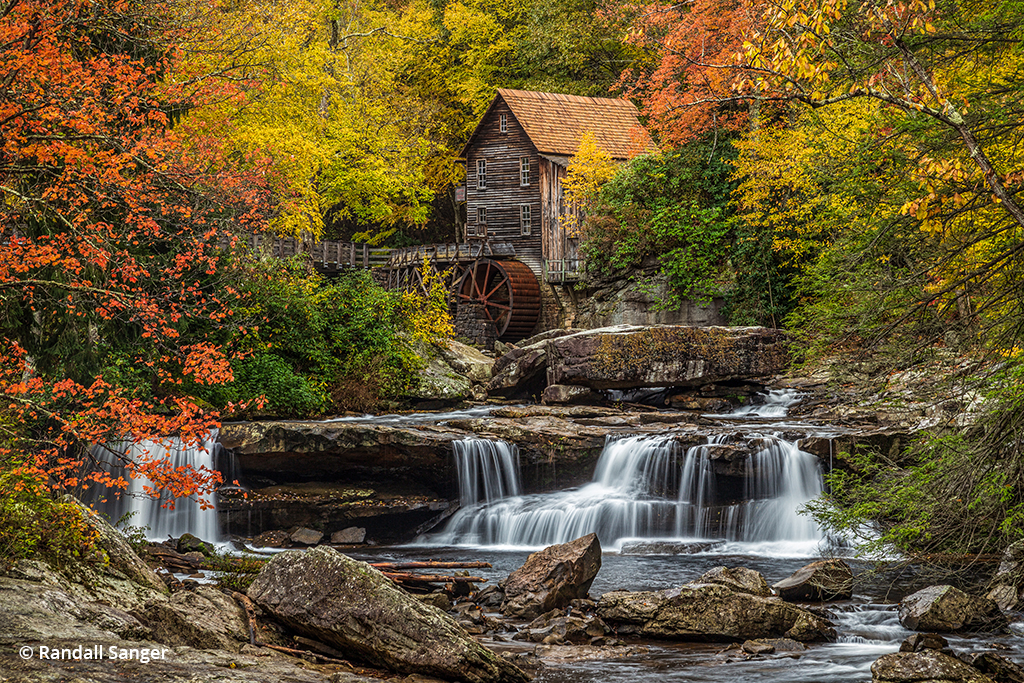
Glade Creek Falls
We will again step outside of the national park boundaries here and visit a nearby state park. The iconic Glade Creek Grist Mill in Babcock State Park makes for a dramatic backdrop to this stream-wide waterfall, which sits several yards downstream of the mill. Glade Creek Falls is a beautiful waterfall but having the old grist mill in the background makes this a must-see location. The Glade Creek Grist Mill is easily West Virginia’s most-photographed site, and if you visit here during peak fall foliage season, you will understand why. Be sure to explore downstream from the waterfall, where you will find several pretty cascades and stream scenes.
Lower New River Gorge
Mill Creek Falls
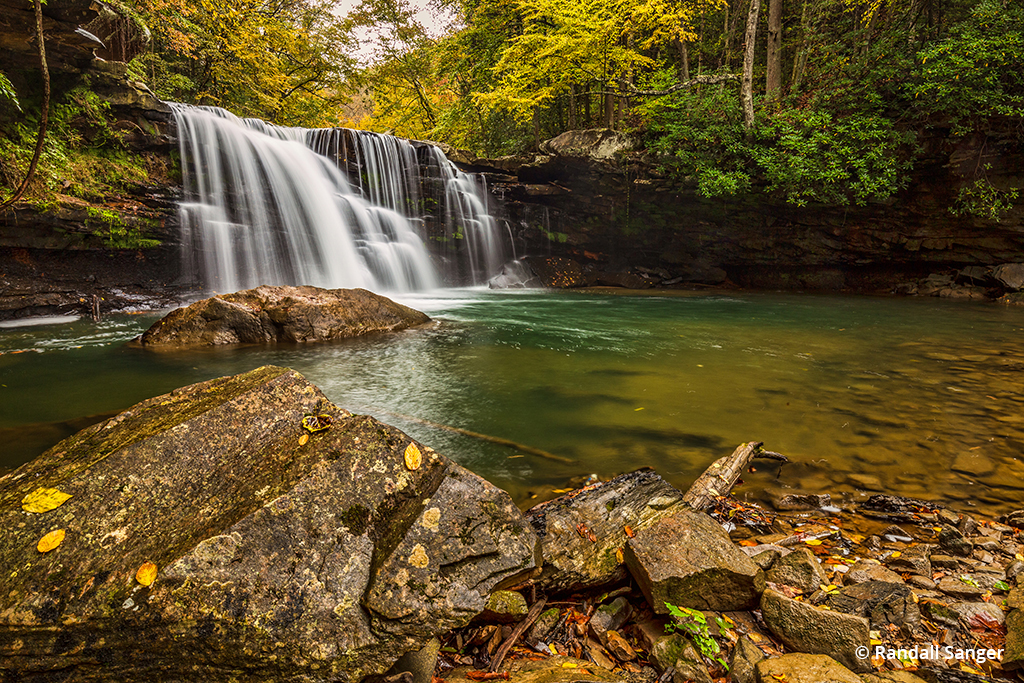
Mill Creek Falls
Mill Creek is a rugged mountain stream full of beautiful stream scenes, small waterfalls, and cascades, with Mill Creek Falls being the highlight. Its setting and the small ledges over which the water courses deliver exceptional photo opportunities in all seasons.
While you can hike to Mill Creek Falls on the historic Ansted Rail Trail, it is much easier to access via Hawks Nest Road, where you can simply park and scramble down to the falls. Continue down the road and take in the view of Hawks Nest Lake, which is the New River held back by a dam just downstream. There is a photogenic railroad bridge over the lake. From the parking area, you can also take an easy half-mile hike on the Fisherman’s Trail to Lower Turkey Creek Falls.
Cathedral Falls
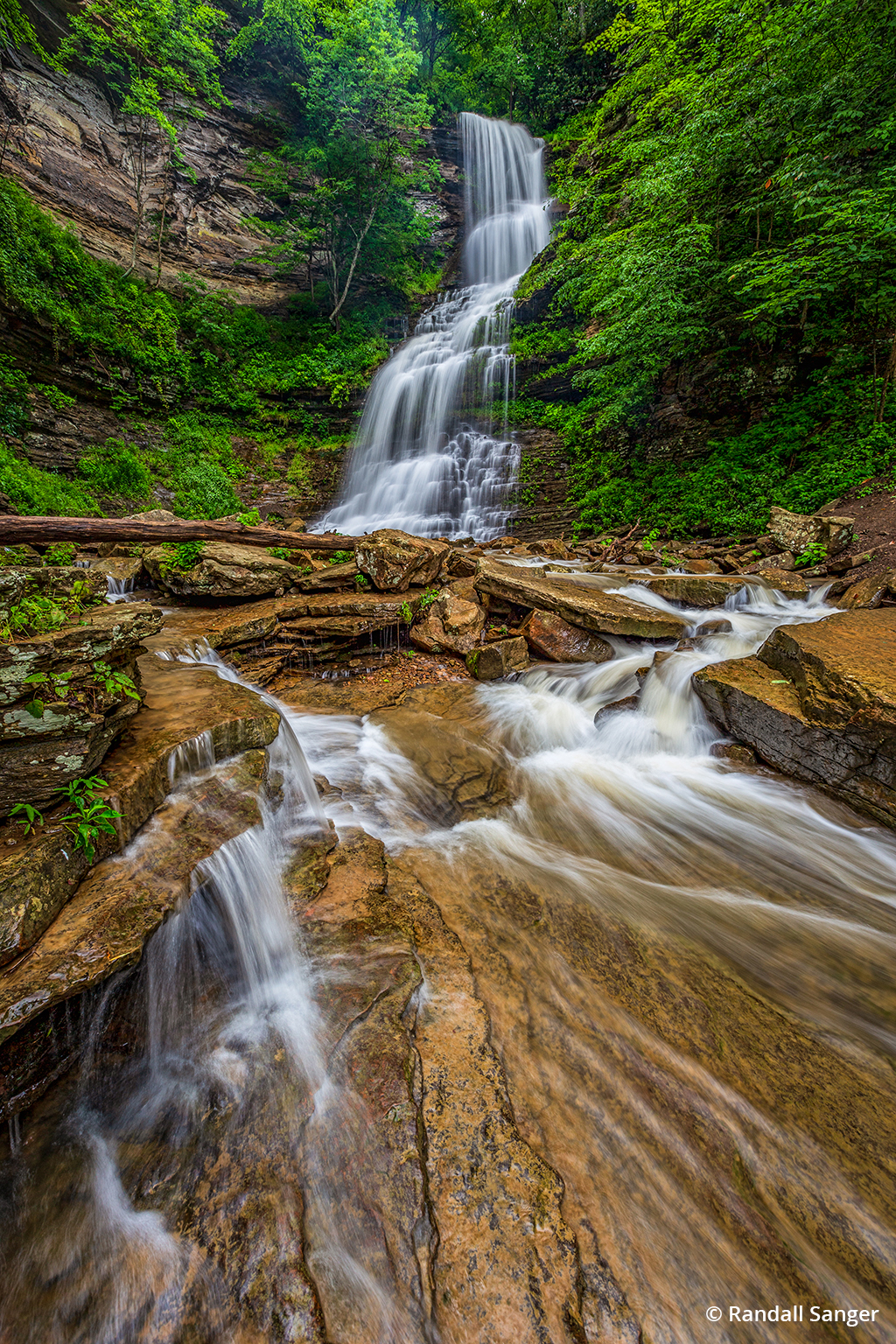
Cathedral Falls
The waters of Cane Branch cascade steeply down a series of ledges into a natural amphitheater surrounded by a narrow canyon with the towering walls on either side, giving one the feeling of being in a cathedral. Cathedral Falls, located right off U.S. Route 60, is one of the tallest and most-visited waterfalls in West Virginia.
You can step out of your car and start taking photographs—Cathedral Falls is that close. The roadside location and sheer beauty of the falls virtually ensures that you will be sharing the falls with others. I have found that visiting early in the morning or on rainy days increases my chances of finding rare solitude at this beautiful waterfall.
See more of Randall Sanger’s work at randallsanger.com.
The post Waterfalls Of New River Gorge appeared first on Outdoor Photographer.

